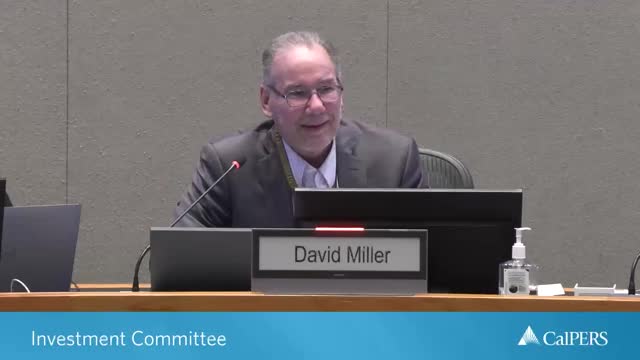CalPERS Sustainable Investments reports $59.7B in climate solutions exposure; responsible contractor policy reports 100% compliance for FY24‑25
Get AI-powered insights, summaries, and transcripts
Subscribe
Summary
CalPERS' Sustainable Investments team reported $59.7 billion in climate‑identified investments, declining portfolio emission intensity, growth in emerging and diverse manager commitments, and progress on labor-principle integration. The Responsible Contractor Policy recorded 100% manager certification and $746 million in certified contractor spending for the year, and staff outlined a labor-focused market study RFP.
The CalPERS Sustainable Investments (SI) program reported further progress in the fund's climate and human‑capital work streams at the Investment Committee meeting. Peter Cashin and the SI team said CalPERS held $59.7 billion in investments identified as climate solutions as of June 30, 2025, up from $50 billion the prior year, and reported an 11% reduction in reported emissions intensity year‑over‑year.
SI presented results from the Climate Transition Index (CTI), a custom equity strategy that aims to match cap‑weighted returns while reducing carbon intensity; Nelson de Contessa said the CTI returned 16.2% in the fiscal year while delivering roughly a 50% cut in carbon intensity relative to the custom cap‑weight comparator in the first year of the strategy.
SI also covered emerging and diverse manager efforts. Private equity made allocations to 17 emerging managers totaling roughly $2.2 billion in FY24‑25 and to 36 managers meeting the program’s diverse-manager definition for about $7.3 billion. The SI team described the TPG Next and GCM Elevate programs that are seeding smaller and diverse managers and noted these vehicles are in early stages of deployment.
Labor and stewardship: SI and public‑equity stewardship teams described development of a labor scoring framework (more than 60 indicators mapped to five pillars such as collective bargaining and health & safety) that will be integrated into monitoring and engagement. The team emphasized that the scoring system is not intended to blacklist companies but to highlight tail risks and prioritize engagement.
Responsible Contractor Policy (RCP): Tamara Sells reported the RCP annual update and said managers certified compliance for FY24‑25; certified responsible contractors received $746 million in fiscal year payments, and over the past decade certified contractors were awarded approximately $8 billion in CalPERS construction and related work. The revamped RCP (effective 07/01/2025) integrates CalPERS labor principles, clarifies expectations, and includes a planned "responsible contractor bidding opportunities" website to increase transparency and access for contractors, unions and stakeholders. Staff also outlined work to issue a labor‑focused market study RFP (target release in March) that will include California emphasis, skilled‑worker definitions, project outreach and an enterprise subcommittee.
Public comment on SI and RCP was extensive. Labor union speakers from UFCW and SEIU pressed for stronger enforcement of labor principles and asked the board to adopt clear accountability measures for asset managers (public examples cited: Heritage/ Cardenas Markets, owned by Apollo), including potential restrictions on allocating new capital to managers who fail to uphold standards. Climate‑focused groups urged tighter criteria for what the fund counts as "climate solutions," arguing fossil‑fuel companies and some carbon‑capture investments should not qualify.
Next steps: SI will continue to refine metrics and dashboards, proceed with planned climate and stewardships workstreams, publish sustainability fact sheets and the climate SB-964 report, and coordinate with TFPM on integrating sustainability metrics into TPA implementation. RCP staff will launch the bidding‑opportunities platform, provide stakeholder training, finalize RFP procurement and keep the board apprised of the market study timeline and subcommittee formation.
